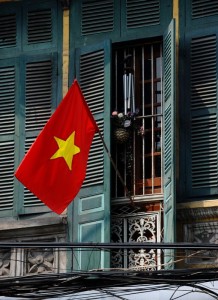January 21, 2015
EU, Vietnam discuss human rights
Praguepost | Jan 20, 2015
In Brussels on Jan. 19, the European Union and Vietnam held the fourth round of their annual enhanced Dialogue on Human Rights in the spirit of the EU-Vietnam Partnership and Cooperation Agreement (PCA) signed in June 2012.
The EU delegation was led by Ugo Astuto, director for South and South East Asia in the European External Action Services (EEAS). The Vietnamese delegation was led by Vu Anh Quang, director general of the International Organisations Department of the Vietnamese Ministry of Foreign Affairs, and included experts from various services, agencies and ministries.
The dialogue allowed the two sides to exchange views on a wide range of issues and was conducted in a frank and open atmosphere. It provided an opportunity to take stock of positive developments in the area of human rights in Vietnam, such as progress toward the ratification of the United Nations Convention on the Rights of Persons with Disabilities and Convention against Torture and Other Cruel, Inhuman or Degrading Treatment, as well as the successful 2014 Universal Periodic Review (UPR). The dialogue was complemented by a meeting with the European Parliament the same day and a visit to a prison in Berlin Jan. 20.
The EU raised issues relating to freedom of expression and the media, including Internet legislation, and expressed concern regarding extensive application of national security provisions in Vietnam’s penal code. The EU reiterated its serious concerns regarding the situation of a number of human rights defenders, activists, bloggers and their relatives. The EU also raised the issue of implementation of freedom of religion or belief, noting both positive developments such as the long-awaited visit by the UN Special Rapporteur for Freedom of Religion or Belief last July and concerns as to persisting restrictions. The EU encouraged Vietnam to move toward a more open society based on the international standards of rule of law and respect for human rights.
The EU, together with some of its member states, supports legal and judicial reforms under preparation in Vietnam, in the light of the Constitution amended in 2013, through technical assistance. The EU pointed to the revision of the penal code as an opportunity to ensure coherence with the principles established in the Constitution and the International Covenant on Civil and Political Rights. The EU stressed the importance of access to lawyers and the right to a fair trial, as well as the need to improve prison conditions. The EU regretted the high number of death sentences handed down in 2014 and reiterated its call on the Vietnamese government to take steps toward eventual abolishment of capital punishment. In this context, the EU encouraged Vietnam to further reduce the number of offences punishable by death penalty and improve prison conditions for persons on death row.
The two sides discussed cooperation in international fora, both on thematic and country-specific issues. The union welcomed Vietnam’s increased engagement with international human rights mechanisms, encouraging Vietnam to use its membership in the UN Human Rights Council to more visibly champion respect for human rights internationally and domestically, and to present soon a roadmap for the implementation of the UPR recommendations. The EU welcomed Vietnam’s willingness to engage further with UN Special Rapporteurs and Working Groups.
Vietnam shared its views on the work of the ASEAN Intergovernmental Commission on Human Rights (AICHR) and on the ASEAN Human Rights Declaration (AHRD) adopted in 2012. The EU appreciates Vietnam’s positive and constructive role as coordinator for EU relations within ASEAN and reiterated its commitment to strengthen dialogue, consultation and cooperation with AICHR.
The EU also raised a number of individual cases of persons in jail, reiterating its request for their immediate release, in particular those in poor health. Furthermore, the EU asked to be granted more visits to these and to be allowed to attend more trials.
The fifth round of the enhanced human rights dialogue will be held in the Vietnamese capital, Hanoi, toward the end of 2015.







January 26, 2015 @ 4:01 PM
Link exchange is nothing else except it is simply placing the other person’s web site link on your page at appropriate place and other person will also do similar in favor of you.